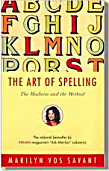
The Madness and the Method

| Book of the Month | ||
 |
The Art of Spelling The Madness and the Method |  |
Publisher: W.W. Norton
Author: Marilyn Vos Savant
$10.25
ISBN 0-393-04903
Those who have struggled with English spelling might believe that there is a lot more 'madness' than 'method'to it. The rule 'I before E except after C' is an example of how complex spelling can get, especially as this 'rule' contains dozens of exceptions, such as 'science', 'vein' and 'weight'. This little book might help. It takes the approach that instead of simply learning spelling we should look at how spelling is learned, and why some words (such as 'niece') are misspelled more often then some complex words (such as 'complex'). As the author points out, poor spelling not only makes communication more difficult, but may well cost points in an exam. But even this book quotes the saying 'English has no rules - only exceptions'. So what 'method' can sort out the 'madness'?
The book begins with a five-part look at the 'madness'. Firstly it asks 'What does your spelling say about you?' The first thought one gets with a misspelled piece of text is either that the writer either does not fully understand English or cannot be bothered to check what has been written. Neither explanation creates a positive impression. The next section is about 'The Spelling Brain' and how people understand spelling. Unfortunately this part does not give enough detail to be really useful. The next section 'The Spelling Police' tells us where the 'rules' come from, and that English spelling began with priests using Latin rules for Anglo-Saxon words. In other words, the system did not work properly right from the start. Also, English pronunciation changed dramatically between 1400 and 1600, and spelling rules didn't. So we still spell words the way they were pronounced in Shakespeare's time. Today of course, technology offers solutions and new complexity. The 'method' is the second part of the book. The method is basically that you should know your words - whether they are Latin, German or Greek in origin, and what prefixes and suffixes are attached. Once you know how and why a word is constructed as it is, spelling it is much easier and more logical. This 203 page book finishes with an index and includes a list of 500 commonly misspelled words.
Who is this book for? If you are having trouble with spelling, this book will give you a way to approach the problem that does not involve simply memorizing hundreds of spellings, rules and exceptions. However, because it is an attractively-written book which contains plenty of language trivia EFL teachers might also consider mining it for interesting bits of information to pass on to a class.
Verdict: A different approach to learning to spell
Assessment 7/10